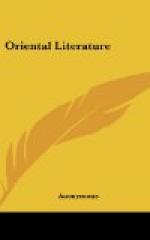[2] Abd Almalec was a native of Arabia Felix.
The exact period when
he flourished is unknown,
but as this production is taken from the
Hamasa it is most probable
that he was anterior to Mohammedanism.
THE DEATH OF HIS MISTRESS[3]
Dost thou wonder that I flew
Charm’d to meet my Leila’s
view?
Dost thou wonder that I hung
Raptur’d on my Leila’s tongue?
If her ghost’s funereal screech
Thro’ the earth my grave should
reach,
On that voice I lov’d so well
My transported ghost would dwell:—
If in death I can descry
Where my Leila’s relics lie,
Saher’s dust will flee away,
There to join his Leila’s clay.
Abu Saher Alhedily.
[3] The sentiment contained in this production
determines its
antiquity. It was
the opinion of the Pagan Arabs that upon the
death of any person
a bird, by them called Manah, issued from his
brain, which haunted
the sepulchre of the deceased, uttering a
lamentable scream.
ON AVARICE[4]
How frail are riches and their joys?
Morn builds the heap which eve destroys;
Yet can they have one sure delight—
The thought that we’ve employed
them right.
What bliss can wealth afford to me
When life’s last solemn hour I see,
When Mavia’s sympathizing sighs
Will but augment my agonies?
Can hoarded gold dispel the gloom
That death must shed around his tomb?
Or cheer the ghost which hovers there,
And fills with shrieks the desert air?
What boots it, Mavia, in the grave,
Whether I lov’d to waste or save?
The hand that millions now can grasp,
In death no more than mine shall clasp.
Were I ambitious to behold
Increasing stores of treasured gold,
Each tribe that roves the desert knows
I might be wealthy if I chose:—
But other joys can gold impart,
Far other wishes warm my heart—
Ne’er may I strive to swell the
heap,
Till want and woe have ceas’d to
weep.
With brow unalter’d I can see
The hour of wealth or poverty:
I’ve drunk from both the cups of
fate,
Nor this could sink, nor that elate.
With fortune blest, I ne’er was
found
To look with scorn on those around;
Nor for the loss of paltry ore,
Shall Hatem seem to Hatem poor.
Hatem Tai.
[4] Hatem Tai was an Arabian chief, who lived
a short time prior to
the promulgation of
Mohammedanism. He has been so much celebrated
through the East for
his generosity that even to this day the
greatest encomium which
can be given to a generous man is to say
that he is as liberal
as Hatem. Hatem was also a poet; but his
talents were principally
exerted in recommending his favorite
virtue.




